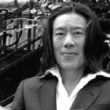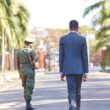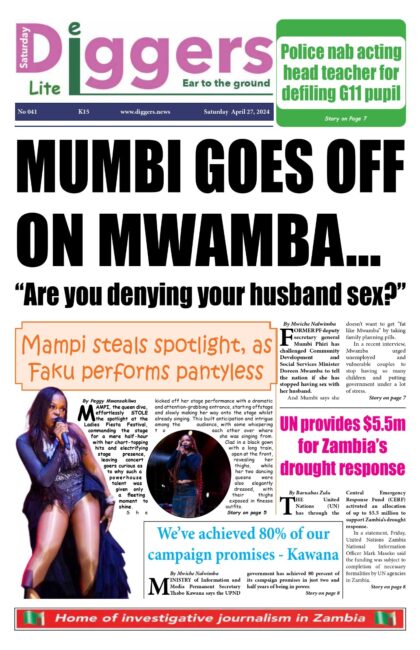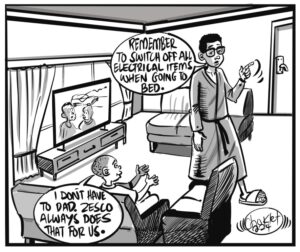On 7 February 2018, opposition United Party for National Development (UPND) leader Hakainde Hichilema argued that President Edgar Lungu has finally confessed to fixing the outcome of the 2016 presidential election. Hichilema’s conclusion drew from a video clip that emerged last week in which President Lungu is seen addressing market traders in Chibombo district, Central Province. He says: ‘Makamaka imwe [i.e. You people especially], even if you vote us out, we will not move out [of power]. You voted us out in 2015, in 2016, [yet] we are still there. So it is time you woke up and begun working with us’. Hichilema seized upon this as evidence that Lungu is finally coming clean and admitting not only that he rigged the previous two elections but is also planning to rig the 2021 poll. ‘We told you that we won the election. Here is Lungu confessing that he was voted out [of power] in 2015, in 2016, but he refused to come out and he will continue refusing to come out [i.e. to relinquish power]’, the UPND leader told hundreds of his party members during a press briefing at which the cited video clip was repeatedly played on loud speaker. I am afraid that his interpretation of the President’s remarks is most misleading. To better understand Lungu’s comments requires moving beyond simplistic and partisan explanations to consider the context within which he made them.
The intended audience of Lungu’s remarks was female market traders in Chibombo, a district that has two electoral constituencies, Keembe and Katuba, that voted for Hichilema in both the 2015 and 2016 elections. In 2016, the UPND parliamentary candidates also won the two constituencies with significant margins. Lungu probably had the area’s recent electoral history in mind and was actually chastising the vendors who he irresponsibly assumed were UPND supporters. The President was pointing out to Chibombo voters that despite their support for the opposition in both 2015 and 2016 elections, PF supporters outvoted them on both occasions, which explains why he and the ruling party remain in power today. In Lungu’s judgement, these traders and other Chibombo residents had got nothing by supposedly supporting the opposition. As a result, he was inviting them to consider joining the winning team, that is to vote for him and ruling Patriotic Front (PF) in future elections. Here, Lungu was predicting that those who support the PF would outvote these opposition-supporting traders again in 2021. His argument that ‘even if you vote us out, we will not move out [of power] should, in my view, be understood in this context, not as an accidental revelation of planned election rigging or a confession for a previous wrong. That Hichilema and the UPND misunderstood Lungu’s comments and even sought to secure political capital out of them reveals a desperate attempt to substantiate their longstanding and otherwise legitimate claims that the 2016 poll was fixed. Lungu has of course consistently and repeatedly denied fixing the 2016 election outcome, and it would be bizarre if he finally let down his guard and blurted out the truth to a handful of market traders whom he had just met.
In my view, Hichilema and the UPND would have done well to engage Lungu on two more important considerations. The first is that Lungu’s Chibombo comments provide an insight into his disturbingly limited understanding of the Constitution and the basic workings of democracy. Why should voters in a multiparty democracy be rebuked for supporting one party over the other? What then is the use of having constitutional provisions that guarantee multipartism and the right to vote for a candidate or party of one’s choice? Any functioning democracy should be a market place of ideas and Lungu would do well to promote messages that encourage political participation and tolerance for diversity. Chibombo residents have the right to vote for whichever party or leader they think best represents their aspirations and interests. Democracy should be about seeking support for one’s ideas, policies, representing the ideas of others and convincing voters to offer their support. To conflate electoral politics in a competitive multiparty constitutional democracy with support for the winning party is most unfortunate.
The second point, on which Hichilema and the UPND should have taken Lungu to task, is on his total lack of a national political programme. It was telling that Lungu was inviting the marketers in Chibombo to join the winning team without explaining why they should do so, or without seeking to understand the basis of their support for the opposition. It did not occur to him that, in return for their support, he could offer the Chibombo voters promises of tangible benefits such as provision of services, better market places in which to conduct their trading activities, more jobs, improved infrastructure, better schools, increased education opportunities, better agricultural plans and other positive policies which might encourage them to vote for the PF in future. Lungu has nothing to offer voters and wants power for power’s own sake. It would appear that even after winning that power, he has no idea what to do with it other than to retain it. All Lungu is offering the voters of Chibombo and others elsewhere is the satisfaction of being on the winning team. For him, politics is a game that one plays to win or lose, and it is better to win. But what exactly is the prize for winning, since voters cannot eat satisfaction? It is embarrassing to have someone like Lungu for a national President, a man who is supposed to reflect our greatest aspirations when he himself has none. Equally embarrassing is to have someone like Hichilema as our leading political alternative, a man who appears increasingly incapable of identifying, revealing and exposing Lungu’s manifold inadequacies before subsequently presenting his own alternative vision and mobilising voters around wider concerns or shared elements of a national programme.
Lungu’s inadequacies are so many that further failings do not need to be invented. By seizing on Lungu’s Chibombo comments as irrefutable evidence of high-level conspiracy in relation to the previous and future elections, Hichilema and the UPND are misleading citizens and missing the opportunity to take advantage of the waves of present weaknesses and mediocrity in Zambia’s politics to focus their energies on substantive issues. It is likely that Lungu is planning to rig the 2021 elections, but I do not think he would be so careless, even by his own poor standards, to reveal this information in ordinary conversations with voters. The response by Hichilema and the UPND to Lungu’s remarks illustrates a more salient point: that the opposition have consistently underestimated Lungu and many within the UPND ranks even believe him to be totally incompetent and personally unintelligent. This explains their latest belief that he could so unwisely reveal his rigging plans – a flawed impression that in fact benefits Lungu, as being underestimated helps him win. If Lungu is as incompetent and unintelligent as the opposition would want us to believe, how then does he keep beating them at the ballot and what does that outcome, however secured, say about them?
For any feedback, please email [email protected]












